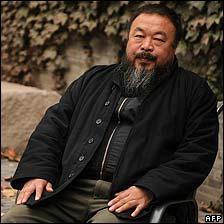Ai Weiwei: China's dissident artist
- Published

The artist has been highly vocal about human rights issues in China
Ai Weiwei is both one of China's best-known artists and one of its highest-profile government critics.
The bearded 55-year-old is also the son of one of the Communist Party's most revered poets - making his criticism particularly difficult for the authorities to handle.
He has spoken out against human rights abuses and urged Beijing to reform its political system.
"We have a government that, after 60 years in power, doesn't give its own people the right to choose its leaders," he told the BBC in November 2010.
"This is a society that sacrifices people's rights and happiness to make a profit."
In April 2011, he was detained by the authorities as he boarded a Hong Kong-bound flight and held in a secret location for 81 days.
He was freed on condition that he would not speak to the media - a condition he has not kept.
The authorities said he had been investigated for "economic crimes" and several months later served him with a bill for 15m yuan ($2.4m; £1.5m) in back-taxes and fines for a firm called Fake Cultural Development.
Mr Ai is a designer of the firm, but his wife is its legal representative. He challenged the fine in court, with thousands of people donating money to help.
After the court rejected his appeal, the artist said via Twitter: 'We will keep appealing, until the day comes when we have nothing to lose.''
'Empty event'
Born in 1957 in Beijing, Ai Weiwei has played a key role in contemporary Chinese art over the last two decades.
He is the son of one of China's most famous poets, Ai Qing, a Communist Party member revered today despite being sent to a labour camp during the Cultural Revolution.
The family lived in Xinjiang, in China's far north-west, until Ai Qing was formally rehabilitated and allowed to return to Beijing.
There Ai Weiwei studied at the Beijing Film Academy and was a founder member of an art group called The Stars.
He then spent more than a decade in the US before returning to China.
It was his involvement in the design of Beijing's Olympic stadium that brought him international prominence.
Working with Swiss architects, he helped design the Bird's Nest structure now recognised around the world.
But even as his work was hailed, Ai Weiwei spoke out against the Olympics, describing them as a government-controlled "empty event" not shared by ordinary citizens.
He then went on to court controversy in the wake of the devastating May 2008 Sichuan earthquake.
Several schools collapsed, prompting accusations from parents that they had been poorly built because of official corruption.
Mr Ai produced Remembering, a wall of Chinese text made from children's backpacks that covered the facade of the Haus der Kunst in Munich, Germany. The text read: "'She lived happily for seven years in this world" - the words of a mother whose daughter died in the quake.
He also compiled a list of the names of the children who died, and accused the government of exacerbating parents' grief with official denial.
"These people are still constantly asking questions and nobody will ever answer them because the government is trying to hide the true problems of the collapse of the school buildings," he told the BBC in May 2009.
He later accused police of beating him as he attended the trial of another activist, Tan Zuoren, who had spoken out on the same issue.
'Taboos'
He wrote a well-read blog where he posted films, photos and political opinions, but this was shut down in May 2009.
In October 2010 Ai Weiwei unveiled his latest work - a carpet of 100 million porcelain sunflower seeds - at the Tate Modern gallery in London.
He has described the work as a commentary on mass production and a question about the role of an individual in society.
By then, the authorities in Beijing were paying him considerable attention.
In December 2010, days before the Nobel Peace Prize award ceremony for imprisoned campaigner Liu Xiaobo, like several other campaigners he was told he could not travel abroad.
A month later, his studio in Shanghai was demolished. Officials said he had failed to obtain planning permission for the building, but Mr Ai said the move was linked to his activism.
He was then detained in April 2011 at Beijing airport. A Chinese foreign ministry spokesman said he was being investigated "according to the law".
His bail ended a year after his 22 June 2011 release from custody, but Mr Ai said he was still subject to restrictions.
"My feelings are very mixed," he said. "They told me I cannot leave the nation. I asked them for how long and they said: 'We cannot answer you'. It seems very disappointing."
- Published7 April 2011
- Published5 April 2011
- Published8 November 2010